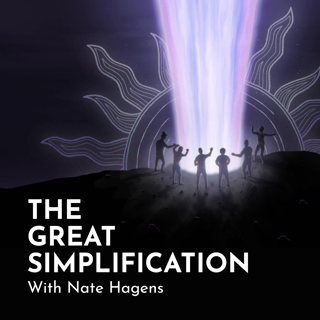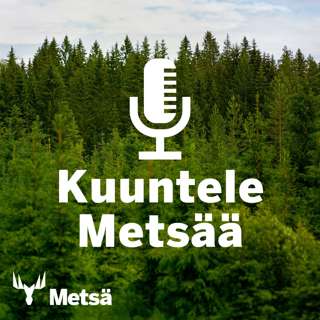
Just Stop Oil !? Part 4 - The Intersection | Frankly #41
In Part 4 of this Frankly mini-series, Nate concludes the deep dive into the nexus between “just stopping oil” and “just pumping oil” with 10 guideposts which might help us to navigate through the intersection of the Four Horsemen of the 2020s and the shrinking Web of Life….together known as The Great Simplification. From decomplexifying at various scales to a change of consciousness arising from more humans focused on "Inner Tech", there are many ways we as individuals and as a part of the greater society can manage the push and pull of both environment and economic issues while remaining grounded in the reality of energy, technology, behavior, and the economy. For Show Notes and More: https://www.thegreatsimplification.com/frankly-original/41-just-stop-oil-part-4-the-intersection To watch on Youtube: https://youtu.be/_C8rR5OR74Y
11 Elo 202326min

Doomberg: "Our Fragile Energy Economy"
On this episode, Nate is joined by Doomberg - the anonymous energy/finance analyst team (visually presenting as a talking chicken icon) who uses an energy lens to analyze global trends in the economy, with so far some remarkable accuracy. In this wide ranging discussion, Doomberg and Nate cover the interactions between geopolitics, debt, climate policy, and - of course - energy. How have the narratives created around different types of energy - from renewables to nuclear - affected current policy making around the world? Will the increasingly precarious state of the global debt and monetary system shift the geopolitical landscape? How have increasing global tensions combined with a rise in green energy policy affected nations’ desire for energy security - and what does it mean for future policy as we enter a period of decreasing energy availability? About Doomberg In May of 2021, Doomberg was started by a team of professionals experienced in heavy industry, private equity, and the hard sciences to highlight the fundamentals missing from many economic and policy decisions, and it quickly grew to be one of the most widely read finance newsletters on Substack. Doomberg covers topics from energy, finance, to the economy at large, in an attempt to improve society's thinking and clarity to complex problems. Watch on YouTube https://youtu.be/pYkmJOhWtSU Show Notes & More Info https://www.thegreatsimplification.com/episode/83-doomberg
9 Elo 20231h 42min

Just Stop Oil !? Part 3 - 10 Pathways to Post-Growth | Frankly #40
In Part 3 of this Frankly Series, Nate (just after watching the movie Oppenheimer!) breaks down the logic of how we COULD arrive at a post-growth future. Our global situation is complex and not static - IF we somehow are able to shrink the global economic output (which would imply significantly less oil use) we first have to navigate ‘the 4 Horsemen of the 2020s’. Nate outlines 10 possible avenues for how this could happen, not as a prescription but as a description of various possible scenarios. The implications of the complexity of our global systems means a path to a world without our current dependence on growth will not be an easy one. Yet understanding these hurdles between our current situation and an eventual post-growth future is essential to shifting the initial conditions of such a global transformation towards ‘better-than-the-default’ outcomes. How do impending and converging risks narrow our options for ways to move towards a different global system - and can we manage to protect the things that make life worth living? Watch on Youtube: https://youtu.be/EhOhfRrvYI0 For Show Notes and More: For Show Notes and more: https://www.thegreatsimplification.com/frankly-original/40-just-stop-oil-part-3-10-pathways-to-post-growth
4 Elo 202328min

Kevin Anderson: "The Uncomfortable Link between Climate and Equity"
On this episode, Nate is joined by climate scientist Kevin Anderson to discuss the possible paths of averting severe climate outcomes and how this is interconnected with equity. As nations plan their climate goals and coordinate with each other, it’s clear that extreme actions would be needed from everyone to meet the goal of keeping the global average temperature increase below 2ºC - if this is even possible. At the same time, there are wide disparities in the greenhouse gas emissions between the materially wealthiest and poorest within and across countries. How are past inequities already affecting people in presently climate impacted zones? How can concerned individuals begin incorporating changes and communicating with others in their own lives - and is it even worth it to do so? How can we attempt to balance the equity in standards of living and create rapid reductions in emissions, all while grappling with growing geopolitical tensions, declining energy availability, and the multitude of other converging risks in this impending poly-crisis. About Kevin Anderson: Kevin is professor of Energy and Climate Change at the University of Manchester and visiting professor at the Universities of Uppsala (Sweden) and Bergen (Norway). Formerly he held the position of Zennström professor (in Uppsala) and was director of the Tyndall Centre for Climate Change Research (UK). Kevin engages widely with governments, industry and civil society, and remains research active with publications in Climate policy, Nature and Science. He has a decade’s industrial experience in the petrochemical industry, is a chartered engineer and fellow of the Institution of Mechanical Engineers. For Show Notes and More visit: https://www.thegreatsimplification.com/episode/82-kevin-anderson To watch this video episode on YouTube: https://youtu.be/aQzdK1uGhWA
2 Elo 20231h 28min

Just Stop Oil !? Part 2 - Oil is the Economy | Frankly #39
In Part 2 of this Frankly Series, Nate breaks down why energy - and specifically oil - is currently the central foundation of our entire modern economic system. There are ecological and energetic laws that apply to all life, including humans and our economies. By accessing a huge surplus of dense carbon energy in the form of fossil sunlight, we’ve effectively turbo-boosted our economies, populations, and material wealth - but what happens if this fossil abundance were to go away? What are the systemic implications of an economy tethered to growth, tethered to carbon? Is it even possible for us to choose to stop using oil? How do these complex constraints on our global systems affect the options - and most likely outcomes - in a future with declining oil availability and rising climate insecurity? For Show Notes and More: https://www.thegreatsimplification.com/frankly-original/39-just-stop-oil-part-2-oil-is-the-economy To Watch on YouTube: https://youtu.be/-585aVUNz68
28 Heinä 202331min

Roger Pielke Jr: "Understanding the Origins of Climate Models"
On this episode, Nate is joined by climate and policy scientist Roger Pielke Jr. to discuss the progression of climate research and modeling. The climate activist community is based around projections of what a future might look like given the actions of society - an important tool in the push for urgent climate action. Yet, just like with any other model, the assumptions and parameters can greatly shape the outcomes. How has climate science been shaped by previous models and public perception? How did 2Cº come to be our common climate goal post? Are we anticipating the future within the most likely range of possibilities, or are we polarizing ourselves to the extremes of climate denial and climate doom? About Roger Pielke Jr. Dr. Roger Pielke Jr. is a professor at the University of Colorado where he teaches environmental science and policy. A lifetime scholar with many interests, Roger researches and writes on subjects from understanding the politicization of science to decision making under uncertainty to policy education for scientists in areas such as climate change, disaster mitigation, and world trade. His most recent book, The Rightful Place of Science: Disasters and Climate Change takes a deeper look at the IPCC and climate science and how it is being interpreted in the media. Roger also oversees a popular Substack - The Honest Broker - where he is experimenting with a new approach to research, writing and public engagement. Roger holds degrees in mathematics, public policy and political science, all from the University of Colorado Boulder. For Show Notes and More visit: https://www.thegreatsimplification.com/episode/81-roger-pielke To watch this video episode on YouTube: https://youtu.be/T6Nx4SYZIvQ
26 Heinä 20231h 18min

The 7 Things That Scare Me Most | Frankly #38
In this week’s Frankly, Nate expands upon something he finds himself saying more frequently these days; ”what scares me the most is…”. From the likelihood of nuclear war to how our human in/action harms innocent animals, Nate opens up about his personal list of deepest fears. Contrasting his childhood fear of [harmless] spiders against his current fear of humans’ propensity towards [what is now existential] apathy as we face the metacrisis, Nate reminds us how much more complex our lives are in 2023. Can we be courageous and face our own fears head on, rather than feeling paralyzed by them? For Show Notes and More: https://www.thegreatsimplification.com/frankly-original/38-the-7-things-that-scare-me-most Watch on Youtube: https://www.youtube.com/watch?v=psWmpCOvvmg&t=2s
21 Heinä 202312min

Taimur Ahmad: "Energy Inequality in the Polycrisis"
On this episode, Nate is joined by recent Stanford graduate and biophysical researcher Taimur Ahmad to discuss energy inequality within and across nations. Taimur offers a unique perspective as someone who has spent years studying the issues of the polycrisis, while also having experience growing up in Pakistan and living in the United States. How does the culture of a nation and its access to energy interrelate to create huge differences in the daily lives of the people who live there? How do the looming implications of climate change and energy depletion impact the relationship between the Global North and the Global South? And how do issues of class, wealth, and ‘fictitious capital’ interplay with the larger poly-crisis at hand? About Taimur Ahmad Taimur Ahmad is the author of the Fictitious Capital newsletter where he writes about understanding the base layer of the global system: money/finance, energy, and raw materials. He studied economics at Georgetown University in Qatar and recently completed a graduate degree from Stanford University where he focused on energy policy and electricity markets. After working in agricultural development in Pakistan, he worked in the Middle East supporting clients across energy, CP&I, and national development. From these experiences, he realized the importance of reframing contemporary socioeconomic issues in an energy and ecological systems framework. His work is now focused on exploring the intersection of development in the Global South, degrowth/post-growth, MMT, and leftist social theory. To watch this video episode on YouTube: https://youtu.be/4hzDKA0aNJk For show notes, and more information: https://www.thegreatsimplification.com/episode/80-taimur-ahmad
19 Heinä 20231h 13min





















